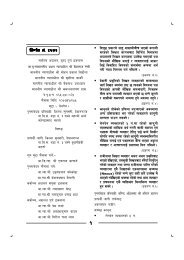The Nepali Judiciary - Supreme Court Of Nepal
The Nepali Judiciary - Supreme Court Of Nepal
The Nepali Judiciary - Supreme Court Of Nepal
Create successful ePaper yourself
Turn your PDF publications into a flip-book with our unique Google optimized e-Paper software.
Introduction<br />
<strong>The</strong> process of planned reformation is a novel practice for the judiciary. <strong>The</strong> First Five-Year<br />
Strategic Plan of the <strong><strong>Nepal</strong>i</strong> <strong>Judiciary</strong> was formulated and implemented five years ago. Whatever<br />
maybe the status of the evaluation of achievements made with regards to the objective of the Plan,<br />
the judicial process in the absence of judicial reform will not be able to maintain the expected<br />
satisfaction of the court users and pursuant to the democratic need, the court cannot play an<br />
effective role of the guardian of the rule of law and in this regard the first Plan has sent a message<br />
that such reforms is possible only through a planned process. <strong>The</strong> fact that the effectiveness of the<br />
justice sector has a positive relation between the investment in the justice sector and the overall<br />
economic development of the nation has been created among the principal stakeholders and I feel<br />
that this has been one of the most important aspect of the this Plan.<br />
During the plan period and from the data available although expected result could not be achieved<br />
with regards to the disposal of cases, satisfactory results have been achieved in the various areas<br />
of strategic intervention. Principally, from the management to the lower level of staff have had the<br />
opportunity of being acquainted with the mission, vision and objective and principal activities. We<br />
have realized the importance and appropriateness of planned development and concept of working<br />
in a planned manner has been initiated. <strong>The</strong>re has been commendable achievement in the area of<br />
capacity development of man power and in the infrastructure of the courts. <strong>The</strong> achievement made<br />
in the procurement of land, building, furniture, modes of transport, computer and electronic goods<br />
and the application of information technology is worth mentioning. This has without any doubt<br />
created congenial working environment for the man power involved in the justice sector and has<br />
generated commitment towards their work. Studies and research made available through various<br />
committees has enabled us to identify the problems vexing the judiciary and we have been<br />
successful in indentifying the possibilities of reformation.<br />
<strong>The</strong> period of the first Plan witnessed extensive changes in the political and social sphere. <strong>The</strong><br />
basic values and recognition prevalent therein with regards to the constitutional and political<br />
conditions and political infrastructure has changed. <strong>The</strong> State was in a state of conflict during the<br />
commencement of the first Plan. Although the situation of conflict has abated, complete stability<br />
has not been achieved in the management of the State. Instability, perplexity and confusion are<br />
synonymous to the present transitional period. Even when the nation is passing through a<br />
transitional phase, the judiciary cannot withdraw from its constitutional obligations. <strong>The</strong> judiciary is<br />
vested with additional obligations and is vested with the responsibility of providing leadership with<br />
regards to the challenges faced during the transitional period and in the process of establishing<br />
rule of law. For this, it is necessary that introspection should be made as soon as possible and<br />
reform plans should be formulated for judicial reform.<br />
Matter of judicial reform is not only the responsibility of the court but rather it is an overall process.<br />
<strong>The</strong> work of judiciary is directly attached with the roles of other governmental organizations<br />
applying State power, bodies, legal professions, court users and civil society. Judicial work is the<br />
core function of the court and even if this may seem to be the responsibility of the court only, this<br />
work cannot be executed by the sole participation of the court. <strong>The</strong> quality and level of role played<br />
by the government, political parties, civil society, prosecutors, investigation units, lawyers and<br />
stakeholder groups of the justice sector and the nature of assistance provided by them in judicial<br />
C




![lg0f{o g+=&(&# g]=sf=k= @)^% ;af]{Rr cbfnt ljz]if Ohnf; ;DdfggLo k ...](https://img.yumpu.com/10045627/1/190x245/lg0fo-g-gsfk-afrr-cbfnt-ljzif-ohnf-ddfgglo-k-.jpg?quality=85)
![lg0f{o g+=&(@% g]=sf=k= @)^% ;jf]{Rr cbfnt, ljz]if Ohnf; dfggLo ...](https://img.yumpu.com/6479513/1/190x245/lg0fo-g-gsfk-jfrr-cbfnt-ljzif-ohnf-dfgglo-.jpg?quality=85)

![lgj]b s ljkIfL - Supreme Court Of Nepal](https://img.yumpu.com/5482729/1/190x245/lgjb-s-ljkifl-supreme-court-of-nepal.jpg?quality=85)